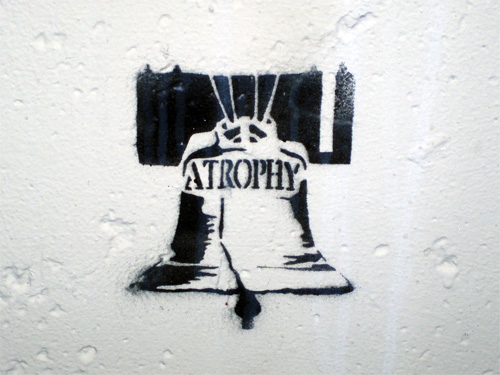Adam is right, of course. The crucial question about whether or not I'm wasting my life -- about whether or not anyone is wasting his life -- is "what exactly [is] a good Christian supposed to do with his or her new life in Christ?" I posed the original question (am I wasting my life) as a result of reading and listening to John Piper. Adam answered the question from his own perspective, I'll start by answering it from Pastor John's perspective.
Pastor John has written a short pamphlet entitled, appropriately enough, "Don't Waste Your Life". His intro to the book provides a succinct answer to the question:
God created us to live with a single passion: to joyfully display his supreme excellence in all spheres of life. The wasted life is the life without this passion. God calls us to pray and think and dream and plan and work, not to be made much of, but to make much of him in every part of our lives.
Later in the second chapter, he expands on that a bit more:
God created me--and you--to live with a single, all-embracing, all-transforming passion--namely, a passion to glorify God by enjoying and displaying his supreme excellence in all the spheres of life. Enjoying and displaying are both crucial. If we try to display the excellence of God without joy in it, we will display a shell of hypocrisy and create scorn or legalism. But if we claim to enjoy his excellence and do not display it for others to see and admire, we deceive ourselves, because the mark of God-enthralled joy is to overflow and expand by extending itself into the hearts of others. The wasted life is the life without a passion for the supremacy of God in all things for the joy of all peoples.
The book itself attempts to answer the question "What does this mean I should do?" He says:
It has become clearer that God being glorified and God being enjoyed are not separate categories. They relate to each other not like fruit and animals, but like fruit and apples. Apples are one kind of fruit. Enjoying God supremely is one way to glorify him. Enjoying God makes him look supremely valuable.
And, later:
Jesus said, "If anyone would come after me, let him deny himself and take up his cross daily and follow me" (Luke 9:23). Daily Christian living is daily Christian dying. The dying I have in mind is the dying of comfort and security and reputation and health and family and friends and wealth and homeland. These may be taken from us at any time in the path of Christ-exalting obedience. To die daily the way Paul did, and to take up our cross daily the way Jesus commanded, is to embrace this life of loss for Christ's sake and count it gain. In other words, the way we honor Christ in death is to treasure Jesus above the gift of life, and the way we honor Christ in life is to treasure Jesus above life's gifts.
... But what I know even more surely is that the greatest joy in God comes from giving his gifts away, not in hoarding them for ourselves. It is good to work and have. It is better to work and have in order to give. God's glory shines more brightly when he satisfies us in times of loss than when he provides for us in times of plenty. The health, wealth, and prosperity "gospel" swallows up the beauty of Christ in the beauty of his gifts and turns the gifts into idols. The world is not impressed when Christians get rich and say thanks to God. They are impressed when God is so satisfying that we give our riches away for Christ's sake and count it gain.
This was part of what gave rise to my original question. By this definition, am I wasting my life? I'm rich. Historically speaking (as we've previously discussed, Adam) I'm ridiculously, fabulously wealthy. I can listen to almost anything I want -- spoken or musical -- at any time. I can watch nearly any form of any entertainment at any time. I have access to thousands of books within days or minutes. Most of the world's knowledge is at my fingertips, thanks to the Internet.
I'm pretty well-off by American standards as well. Our household owns 3 computers, 2 iPods, 2 completely paid off cars, 18% of a house, lots of nice clothes, and plenty of food. We can eat out nearly anytime we want to, we can and do fly around the U.S., we rent nice cars and stay in nice hotels on vacation. I have a beautiful, helpful wife who loves me. We have two beautiful daughters. All four of us are in perfect health. In short, I'm doing pretty well at doing as Voltaire's Candide said: "', i.e. enjoy your work, wife, and life - in short, function as you were made to function - and leave the rest up to God."
But, so what? Is that really all there is? Just be thankful that I'm one of the lucky ones and enjoy my wealth? Most days, I'm very tempted to say "yes". God gave it to me, why should I complain about it? But other days I wonder -- am I wasting His gifts? Am I wasting my life?
If, tomorrow, everything were to disappear in a Job-like orgy of destruction, how would I react? Would I praise God and say "Naked I came from my mother's womb, and naked shall I return. The Lord gave, and the Lord has taken away; blessed be the name of the Lord" (Job 1:21)? Put differently, is God the most important thing in my life or are my things the most important thing in my life?
My original post also referenced the Rwandan genocide. Many Rwandan Christians reacted as violently and savagely as non-Christians when everything was stripped away from them. I'd like to think I wouldn't do the same thing in the same situation. I'd like to think that my reaction would show that God is the most important thing in my life -- even more important than my family.
God willing, I'll never have to go through that situation and I'll never have to find out the hard way. But it's something I think about as I examine my own priorities and how I react to my stuff.
Now, you also mentioned Luther's solution of passive righteousness to the dilemma of how to improve yourself -- how to become more like God and less like a sinner. And, Luther is right. The two opposite extremes are excessive pride in your accomplishments and excessive despair at your failures.
Personally, I've found Tim Keller to be a big help in understanding how this works. I'll quote from his book The Reason for God. He says:
Religion operates on the principle "I obey--therefore I am accepted by God." But the operating principle of the gospel is "I am accepted by God through what Christ has done--therefore I obey." Two people living their lives on the basis of these two different principles may sit next to each other in the church pew. They both pray, give money generously, and are loyal and faithful to their family and church, trying to live decent lives. However, they do so out of radically different motivations in two radically different spiritual identities, and the result is two radically different kinds of lives.
The primary difference is that of motivation. In religion, we try to obey the divine standards out of fear. We believe that if we don't obey we are going to lose God's blessing in this world and the next. In the gospel, the motivation is one of gratitude for the blessing we have already received because of Christ. While the moralist is forced into obedience, motivated by fear of rejection, a Christian rushes into obedience, motivated by a desire to please and resemble the one who gave his life for us.
I've long lived my life with a constant fear of failure. I'm afraid to try new things because I'm afraid of the consequences of failing at them. That's carried over into my Christian life. I've been afraid to do things for God because I've been afraid of lousing them up and making a bigger mess. Keller (along with C.J. Mahaney and John Piper) has taught me that I can't possibly be any worse than I am. I don't have to worry about God's unhappiness if I fail to live up to his standards and I don't have to bend myself into a pretzel trying to be perfect. Jesus already paid for every single one of my rebellions and moral failures.
I am free to live out my life without endless agonizing over every decision. I'm free to go out and "just do it". I don't have to figure out how to be perfect before doing "it". Whatever I decide I want "it" to be. In a way, I feel like my options are opening up for the first time ever.
Will I do it? Will I step out and do something for God? Will I prove that God is more important than my stuff? Or will I still refuse to take risks, because I don't want to endanger my stuff? Will I use my life profitably or will I waste it?



